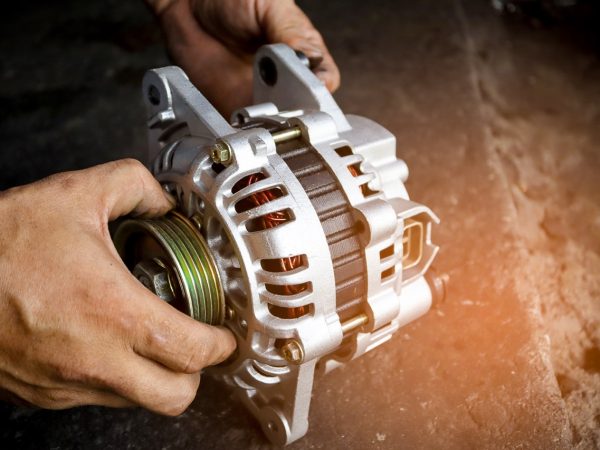24
Jan

Alternators play a crucial role in cars, as they are what provide power to the vehicle when its engine is not on. They do this by turning a magnetic field created by a coil, which then sends electricity through a wire that connects to the car’s battery. When the car is running, the alternator uses the difference in voltage between the car’s battery and its own internal voltage to produce more current – the thing that powers your vehicle.

The reason why an automotive alternator fails can be due to many different reasons. Some are easy to diagnose, while others can only be found out through testing. These include, but are not limited to:
A bad or failing voltage regulator is usually the cause of an automotive alternator not charging correctly. A faulty regulator will not let the alternator reach its full potential and give power to your car’s electrical system. This can lead to a variety of issues with your vehicle including poor engine performance, decreased gas mileage and even battery failure due to being overworked. The best way to diagnose this issue is by having your car’s electrical system checked by a professional.
Failing brushes in an alternator can be caused by many different things including, but not limited to: overheating, poor maintenance and excessive strain on the alternator from misalignments or failure of other components such as the drive belt(s). If the brushes fail, then they will no longer be able to create a proper electric current which is needed for your vehicle’s electrical system.
A bad ground can cause a variety of issues with your vehicle including alternator failure. If there is a bad ground, then it will not allow the alternator to charge the car’s battery properly. This can lead to poor engine performance and even complete electrical failure if not diagnosed and repaired promptly.
If your alternator fails and you’re looking to replace it with a brand-new one, then you should make sure that the new alternator is up to factory specifications. If it’s not, then this could be a cause for your issue and lead to further problems down the road. You will also want to make sure that the wiring from the alternator to the battery are properly connected as well.
Some of the most important factors to consider when buying a new alternator are the price, warranty and customer service. You will want to make sure that the alternator has a good warranty, as this will help cover any issues that may arise from poor construction or design of the part. Customer service is also very important, as you will want to be able to contact the company easily if there are any questions or concerns about your new purchase.

Besides the alternator, something that can give you similar trouble is the voltage regulator. The regulator is what controls the amount of power going to your car’s electrical system, so if it fails then you will experience a lot of issues with your vehicle. Some common problems include poor engine performance and battery failure.
To diagnose this issue, you will want to first check that there are no fuses blown in the fuse box. If this is not the problem, then it could be due to a bad connection between the alternator and the battery. You will also want to make sure that the alternator is working properly and not overheating.
If you are having trouble with your car’s voltage regulator, then it may be time for a replacement. There are many different brands on the market, so it is important to do your research before purchasing one from a store. Some of the best ones can be found at auto parts stores, but you will also want to look online for even more options. You will find that there are some regulators that fit into certain cars and not others, so it is important to check this out before purchasing one.
The starter motor can also be an issue, in which case you will want to check the starter’s connection with the battery as well as its insulation. If these are not working correctly, then it can cause your car trouble starting up and running properly. You will also want to make sure that there is no corrosion on any of the electrical contacts in your vehicle.
Alternator failure is one of the most common issues with cars today, but it doesn’t have to be this way. By following the tips above, you should be able to diagnose and repair your vehicle’s alternator. If you’re having trouble, then feel free to leave a comment below or visit our homepage for more information on how we can help with your car repairs.